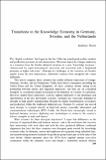| dc.contributor.author | Thelen, Kathleen | |
| dc.date.accessioned | 2019-02-27T16:07:51Z | |
| dc.date.available | 2019-02-27T16:07:51Z | |
| dc.date.issued | 2019-01 | |
| dc.identifier.uri | http://hdl.handle.net/1721.1/120560 | |
| dc.description.abstract | The “digital revolution” that began in the late 1960s has transformed product markets and production processes in rich democracies. Observers depict the changes underway as a transition from the Fordist industrial economy to a new “knowledge economy,” characterized by rapid technological innovation and associated with a heightened premium on higher education.1 Although the challenges of this transition are broadly similar across the rich democracies, individual countries have navigated the course differently. | en_US |
| dc.language.iso | en_US | |
| dc.relation.isversionof | https://jcp.gc.cuny.edu/2018/12/02/volume-51-number-2-january-2019/ | en_US |
| dc.rights | Article is made available in accordance with the publisher's policy and may be subject to US copyright law. Please refer to the publisher's site for terms of use. | en_US |
| dc.source | Thelen | en_US |
| dc.title | Transitions to the Knowledge Economy in Germany, Sweden and the Netherlands | en_US |
| dc.type | Article | en_US |
| dc.identifier.citation | Thelen, Kathleen. "Transitions to the Knowledge Economy in Germany, Sweden, and the Netherlands". Comparative Politics 51, 2 (January 2019) © The Graduate Center, CUNY | en_US |
| dc.contributor.department | Massachusetts Institute of Technology. Department of Political Science | en_US |
| dc.contributor.approver | Thelen, Kathleen | en_US |
| dc.contributor.mitauthor | Thelen, Kathleen | |
| dc.relation.journal | Comparative Politics | en_US |
| dc.eprint.version | Final published version | en_US |
| dc.type.uri | http://purl.org/eprint/type/JournalArticle | en_US |
| eprint.status | http://purl.org/eprint/status/PeerReviewed | en_US |
| dspace.orderedauthors | Thelen, Kathleen | en_US |
| dspace.embargo.terms | N | en_US |
| mit.license | PUBLISHER_POLICY | en_US |
